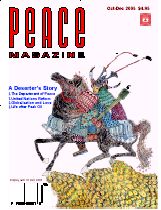
Peace Magazine Oct-Dec 2005, page 21. Some rights reserved.
Search for other articles by Joanna Santa Barbara here
The well-informed knew it would happen. The rest of us reacted with shock and disgust.
Hundreds of diplomats and thousands of nongovernmental organization people wasted four weeks and $3 million in New York while the US and others blocked every possible way of moving forward with the Non-Proliferation Treaty. This is the crucial treaty that requires nuclear-armed states to eliminate nuclear weapons, and binds all other countries to refrain from acquiring them, in exchange for "peaceful nuclear technology." The Canadian diplomatic corps tried hard and failed to rescue the effort, as did many other countries.
It was deeply frustrating for all but the few responsible for wrecking the conference. The US administration walked away smiling and went back to making its new nuclear weapons and its new nuclear weapons policies, making use of these ghastly devices more likely.
What are the rest of us to do? Cower in a corner and wait for the Big Bang? Not likely.
Stalwart veteran anti-nuclear weapons campaigner Doug Roche lost no time in proposing next steps. "Patience has run out. Frustration levels are too high. The NPT process must be reinvigorated if the Treaty is to survive. A working partnership of important non-nuclear States determined to save the NPT must now be forged. While the non-proliferation side of the Treaty must continue to be addressed, the heart of the crisis revolves around Article VI." (Article VI is that part of the NPT that addresses nuclear disarmament.). The Middle Powers Initiative, founded by Doug Roche to bring the political power of "middle powers" to bear against the nuclear weapons states, will hold an "Article VI Forum" in October to try to bring this about.
In July, members of this network representing Physicians for Global Survival, World Federalists, and Project Ploughshares met with members of Foreign Affairs' Nonproliferation, Arms Control and Disarmament division (NACD). These were the same people who had striven at the New York NPT Review Conference to wrest something positive from a failing meeting. We reviewed the causes of failure of the conference. Alongside the refusal of the US and its close allies to permit anything positive to emerge was the failure of coalitions that might stand up to this bloc and reach unified consensus positions. This highlighted the importance of creating and strengthening such coalitions. We hope that Canada will participate in such a coalition of states.
The Comprehensive Teat Ban Treaty needs only a few more states to ratify it before it will enter into force in international law. We discussed Canada's efforts to advance the "entry into force."
We raised the troublesome issue of Canada's contradictory position on nuclear weapons whereby, on the one hand, its policy explicitly endorses elimination of nuclear weapons, and on the other hand Canada signs on to the NATO insistence that nuclear weapons are "essential" for defence of the alliance. This is clearly an area for more peace organization action, bringing the contradiction home more acutely to our government.
We also raised the idea of Canada's becoming an advocate of eliminating the very dangerous "launch on warning" policy whereby Russia and the US hold thousands of their nuclear weapons ready to launch within minutes -- a system vulnerable to catastrophic error. Our NACD colleagues were receptive to this issue and willing to read more on the idea. The possibility arose of presenting it as a new idea to the Conference on Disarmament at Geneva. This too is an issue ripe to be picked up by the peace community.
So, in the aftermath of the wrecked NPT Review, the Canadian peace community can do a number of things:
1. Write to Paul Martin and Foreign Affairs Minister Pierre Pettigrew urging them to convene a coalition of like-minded states to move forward on elimination of nuclear weapons.
2. Point out the contradiction in Canadian policy: NATO policy must change or Canada must dissent from it.
3. Find out about eliminating the dangers of the launch on warning policy and encourage our government to advocate on this issue at the Conference on Disarmament.
4. Praise Canada's work on supporting the NPT and the entry into force of the Comprehensive Teat Ban Treaty.
Joanna Santa Barbara, McMaster University Centre for Peace Studies, Physicians for Global Survival, and TRANSCEND (a peace and development organization; see page 28 this issue)

Peace Magazine Oct-Dec 2005, page 21. Some rights reserved.
Search for other articles by Joanna Santa Barbara here